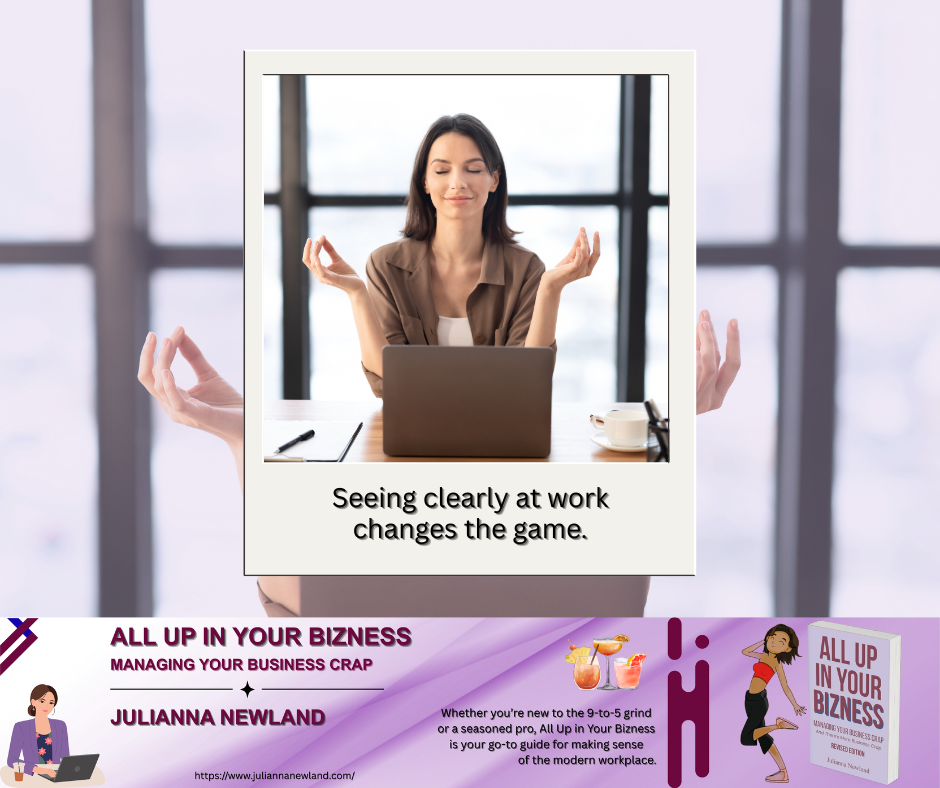“Never get so busy making a living that you forget to make a life.” – Dolly Parton
Remember when burning the midnight oil was a badge of honor? Boomers and Gen Xers sure do. For decades, staying late, skipping dinner, and checking emails at 11 p.m. was just part of being a “dedicated” employee. You finished projects in the office, then brought your laptop home for the second shift right after the kids were in bed, of course.
Julianna Newland captures this perfectly in All Up in Your Bizness: Managing Your Business Crap, where she calls out the generational grind culture for what it was: a badge of burnout.
Back in the ‘80s, ‘90s, and early 2000s, work-life balance was basically a myth. If you clocked out at 5:00, people assumed you were slacking or worse, not committed. The idea of personal time? Cute. But unrealistic.
Enter Millennials and Gen Z: “We’re not doing that.”
As Newland writes, younger generations looked at the “ten hours a day, seven days a week” model and said, “Are you crazy? I have a life to live.” And they weren’t joking.
This wasn’t laziness. It was a correction.
Instead of glorifying exhaustion, Millennials and Gen Z brought a bold new standard to the workplace: boundaries. They demanded flexibility. They advocated for mental health. They questioned why productivity had to come at the cost of happiness and they changed the game.
Now, thanks to their pushback (and yes, some older employees who were secretly just as tired), we’ve got:
Hybrid work schedules
Flexible hours
Mental health programs
Real conversations about burnout
These aren’t perks. Rather, they’re survival tools. And they’re helping everyone breathe easier.
Hustle Is Out. Human Is In.
Newland doesn’t sugarcoat it: we’ve glamorized overwork for far too long. But now, the workplace is shifting. Today’s smartest leaders aren’t measuring commitment by who stays latest. They’re asking better questions:
Are employees healthy?
Are they productive without being depleted?
Are they still excited to show up on Monday?
It’s not about working less. It’s about working smarter. And with trust, flexibility, and the right tools (hello, tech), you can actually do your job and have a life.
Imagine that.
Tech: The Frenemy
Sure, technology helped create this always-on culture. But it’s also helping undo it. When used right, it’s a force for freedom that lets you work from anywhere, set clearer boundaries, and collaborate without burning out.
The catch? You have to let it work for you and not become a slave to the notifications.
The Real Flex? Trust.
Ultimately, this is about trust. Companies that trust their people to manage their time see better results and happier teams. Because when employees feel seen, respected, and supported, they show up stronger.
Newland’s take? Stop pretending people are robots. Start treating them like humans.
TL;DR: Make Life the Priority
The message is clear: don’t wait for burnout to force you into balance. Claim it now.
Because no one remembers how many overtime hours you logged but they will remember if you were present, healthy, and living a life that actually mattered.
To quote Stephen Covey, “The key is not to prioritize what’s on your schedule, but to schedule your priorities.”
And if that means shutting your laptop at 5:00 and walking your dog instead of answering one more email?
You’re not slacking. You’re winning.




